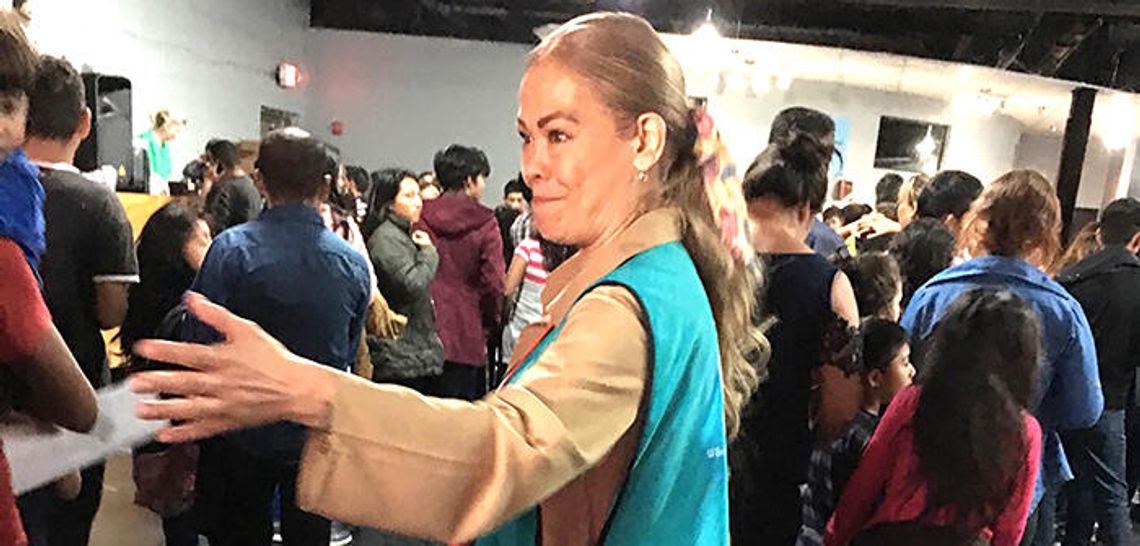By Kate McCarty
Editor’s note: Kate McCarty is a longtime Hays County resident who recently took a trip to the Texas border to donate supplies collected by the Hays County Democrats.
The temperature in the parking lot near the Progreso Bridge in south Texas was 95 degrees, but it was much hotter atop a concrete structure spanning the Rio Grande River.
Standing on the structure were 40 individuals who have been waiting for more than a month for permission to enter the U.S. and state their claim for asylum.
“We didn’t expect this,” said a young Venezuelan mother who was sitting with her 5-year-old son and a coloring book. “We didn’t know about the waiting.”
“We’re doing okay,” said a member of a group of eight Cuban refugees sitting at the far end of the bridge with three pop-up tents. They seemed hot, very hot, and very tired.
Angry Tias and Abuelas, a South Texas advocacy group that began in 2018, visits this bridge and others daily to ensure the migrants have water and food. The government supplies two restrooms at the Progreso Bridge, only one of which was working when I visited. There also is one shower that also is faulty, though provides some water.
So why are these people waiting?
They hope to make a claim for asylum, a form of protection granted to those who demonstrate that they are unable or unwilling to return to their country because of persecution, membership in a particular social group or political opinion. This right was incorporated into international law after the atrocities of World War II, and Congress adopted key elements into U.S. immigration law as part of the 1980 Refugee Act.
I visited the Rio Grande Valley recently to take 12 backpacks of supplies gathered by Hays County Democrats, as well as other bags and boxes of supplies. All of it was organized by Precinct 336 Chairperson Sharon Reed Miller, along with six more backpacks and 10 bags of supplies gathered via a Facebook call from San Marcos resident Jennifer Shaw Fisher.
A few more backpacks and other donations came from the Unitarian Universalist Fellowship of San Marcos and other friends in San Marcos and Buda. Some cash donations also were generated for the groups I am writing about below. My small Chevrolet had a packed full trunk, with more backpacks and donations in the back seat and passenger seat when I left.
But that’s just part of the story.
Joyce Hamilton, one of the eight founders of Angry Tias and Abuelas, spent two days showing me around the Valley. We didn’t visit migrants in detention because that isn’t allowed.
I didn’t, for example, take toothbrushes to detained children at the Clint, Texas, Border Patrol station because, again, that wouldn’t have been allowed. What was done, however, was shedding light on groups that are making a difference where and when they can.
Hamilton, a retired university educator, goes to the Harlingen bus station nearly every day at 9 a.m. to meet migrants who have been released from detention based upon an initial ruling on their claim. She and other Spanish-speaking volunteers provide them with a backpack of snacks, toiletries and other supplies for their journeys, along with advice.
A similar and usually larger operation is happening at the bus station in McAllen, headed by Susan Law, retired human resources director for Texas Rural Legal Aid and a member of the Angry Tias group.
“We really need more volunteers, Spanish-speaking volunteers,” Law said.
They give them a packet that includes a U.S. map, upon which they mark their bus route and transfer points along the way.
“We find they are just shocked to learn that Los Angeles may be a two and a half day trip or New York perhaps a four-day trip. They just had no idea,” Hamilton said.
The migrants also are given a “Know Your Rights” form that lists in Spanish many things they need to be aware of, with the most important highlighted in yellow.
They are given one-on-one cultural orientations. Migrants learn bathrooms are free and water fountains can be used to refill water bottles at no charge.
They receive help in exchanging pesos for dollars if they have money. Some might receive a little cash for their journeys from the Tias, if it’s available.
Migrants also receive a list of attorneys in various cities who may be willing to take their immigration cases pro bono.
They all have a court date for their asylum claim sometime in the future. However in many cases, the hearing is to be in Harlingen or McAllen. Migrants traveling away will need to call and change the location, something that they sometimes do not understand.
This story is the first of a two-part piece on McCarty’s trip to the Texas border. Next week, McCarty takes a deeper dive into south Texas advocacy groups who are assisting migrants.










